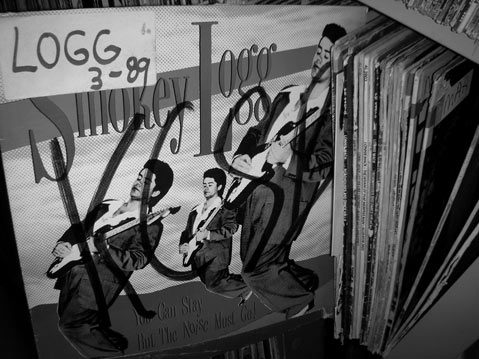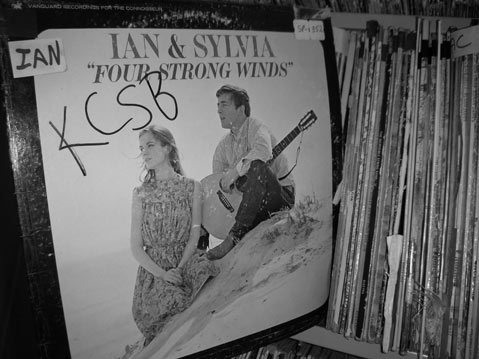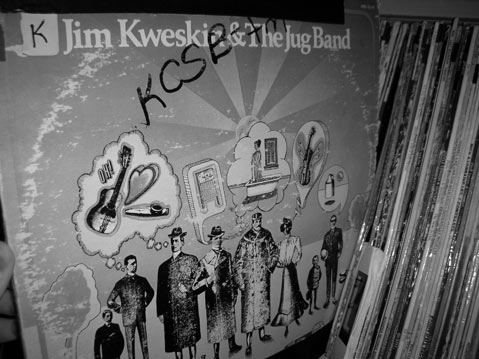Blues Explosion
In Search of the Unusual
What with programs like Leo Schumaker’s Bluesland and Steve Daniels’s Views of the Blues, KCSB would seem to serve blues listeners well.
Yet every time I pass the blues section while browsing the station’s music library, I wonder if only two shows can reasonably handle all the variety of that genre. Though they can be a little hard to find, coming as they do after the gargantuan rock shelves and wedged in there with the folk and country shelves, the blues shelves have a surprising range to offer. Anyone not steeped in the blues, myself especially included, can get complacent about it, assuming it only has a few stock styles to offer. Looking for oddities hidden away in KCSB’s vast walls of vinyl, I can only conclude that blues has much more musical oddness to be exploited.

I began my trek through KCSB’s blues library with Eric Schoenberg’s Steel Strings, a Rounder Records release from 1982. Figuring you should always begin your explorations into foreign territory from a point you already know well, I assumed Schoenberg to be a relative, musically or genetically, of Austrian avant-garde composer Arnold Schoenberg. While listening to Eric Schoenberg’s album reveals no evidence one way or another about these two men’s relative positions on humanity’s family tree, it more or less completely falsified any ideas about their musical similarity.
Eric Schoenberg’s solo guitar-playing sounds as gently melodic as Arnold Schoenberg’s orchestral work could get harshy anti-melodic; Arnold Schoenberg’s music grabs you and demands you pay attention, while Eric Schoenberg’s almost lulls you into forgetting you’re listening to music at all—but in a good way. Driving his placid steel-stringed textures is a fingerpicking technique complicated enough that I don’t even want to think about it. I’d almost rather ponder the patterns underlying an Arnold Schoenberg symphony than directly confront how much practice I’d have to put in to master any given Eric Schoenberg song.

You Can Stay But the Noise Must Go: I think the title commanded me to pull it off the shelf. If not, then surely the name of the artist, Smokey Logg, did the job. Logg’s playing and the production surrounding it has what I’d call a strong “classic” blues vibe, meaning the sort of sound I’d associate with a period piece about a 1950s bluesman. I found that slightly unusual for an album brought out in 1984, inside a sleeve resplendent with all the pinks, blues, and aestheticized pop-art recycling popular with graphic designers of that era.
This all seemed normal enough until I started researching Logg’s background. Evidently he was involved in some sort of bizarre shooting in 2007 wherein an enraged fellow musician (apparently under the influence of a couple different substances and the mistaken impression that Logg’s house was someone else’s) ran up to Logg’s back door and started pounding on it. Intending to fire a warning shot, Logg aimed a little too well. I suppose nobody enters the blues with the expectation of a quiet life.

Aiming to pick the blues album in KCSB’s library that least looks like a blues album, I landed on Ian and Sylvia’s Four Strong Winds. Ian and Sylvia themselves, poised contemplatively atop a sand dune on the cover photo, have that early-1960s youth look you often hear described as “well-scrubbed.” Rarely have I seen two people possessed of a less bluesy appearance. Moments after I dropped the needle on their record, I thought I had them pegged for sure: The first words that came out of their mouths was “Jesus.”
But wait! Examining the wider context, none of the other songs on the album seemed similarly religious, which forced me to rule out the possibility that these wholesome youngsters worked exclusively in the “Bible blues” subgenre. I began to suspect a misfile, but paying closer attention to both the liner notes and musical taught me that this Ian Tyson and Sylvia Fricker practice a kind of musical magpie-ism. You can hear blues and folk in there, sure, but also bluegrass, British prison songs, Canadian work songs, and, as the back cover quotes Ian and Sylvia themselves, “Negro gospel music.”

What better way to conclude this venture into KCSB’s blues shelves than with a double album? The heft of Jim Kweskin and the Jug Band’s Greatest Hits! indicated musical importance, but it also sparked in me the faint hope that it had been recorded by an actual jug band. No such luck, but it nonetheless represents a necessary side trip on some of the blues’ goofier byways. Take, for instance, the excerpt listenable on this page. Opening disc one, side two, the song “Never Swat a Fly” importunes the listener not to kill flies, ants, “slugbugs”—indeed, creatures of any kind. Though many blues songs do seem to carry elaborate metaphorical or allegorical meanings—”About SEX!” one KCSBer of decades past has helpfully penned next to the title of “Beedle Um Bum,” on the first side of the first disc—I believe we can take this one more or less at face value.



